Finding the Right Morgue Fridge for Sale: Step-by-Step Buying Guide
So, you're in the market for a morgue fridge for sale? I understand this isn't exactly an everyday purchase, which is why having the right information matters so much. Let me walk you through what you need to know to make this important decision for your facility.
When searching for the perfect mortuary refrigeration solution, there's a balance to strike between quality, capacity, and budget. Modern units come with features that not only preserve remains with dignity but also make your daily operations smoother and more efficient.
| Quick Facts About Morgue Fridges | Details |
|---|---|
| Price Range (New) | $6,445-$13,995 (US-made) $1,000-$2,500 (Imported) |
| Common Types | Single-body, 2-body, 3-body, walk-in coolers |
| Power Requirements | Most plug into standard 110V outlets |
| Key Features | Digital temperature controls, stainless steel construction, OSHA-compliant handles |
| Warranty | Typically 15 years on panels/doors, 5 years on mechanical parts |
Your ideal morgue fridge for sale depends largely on your facility's specific needs. A small funeral home might be perfectly served by a compact single-body unit, while a busy hospital or medical examiner's office might require a walk-in cooler capable of storing up to 50 bodies simultaneously.
When evaluating options, pay special attention to the insulation R-value, which determines how efficiently the unit maintains temperature. High-quality digital controls allow precise temperature management, while redundant cooling systems provide peace of mind that your unit won't fail when you need it most.
Stainless steel construction isn't just about appearances – it's about durability and ease of cleaning. Look for units that meet NSF and OSHA compliance standards, which ensure both safety and proper functionality. Energy efficiency ratings are also worth considering, as they'll impact your long-term operating costs.
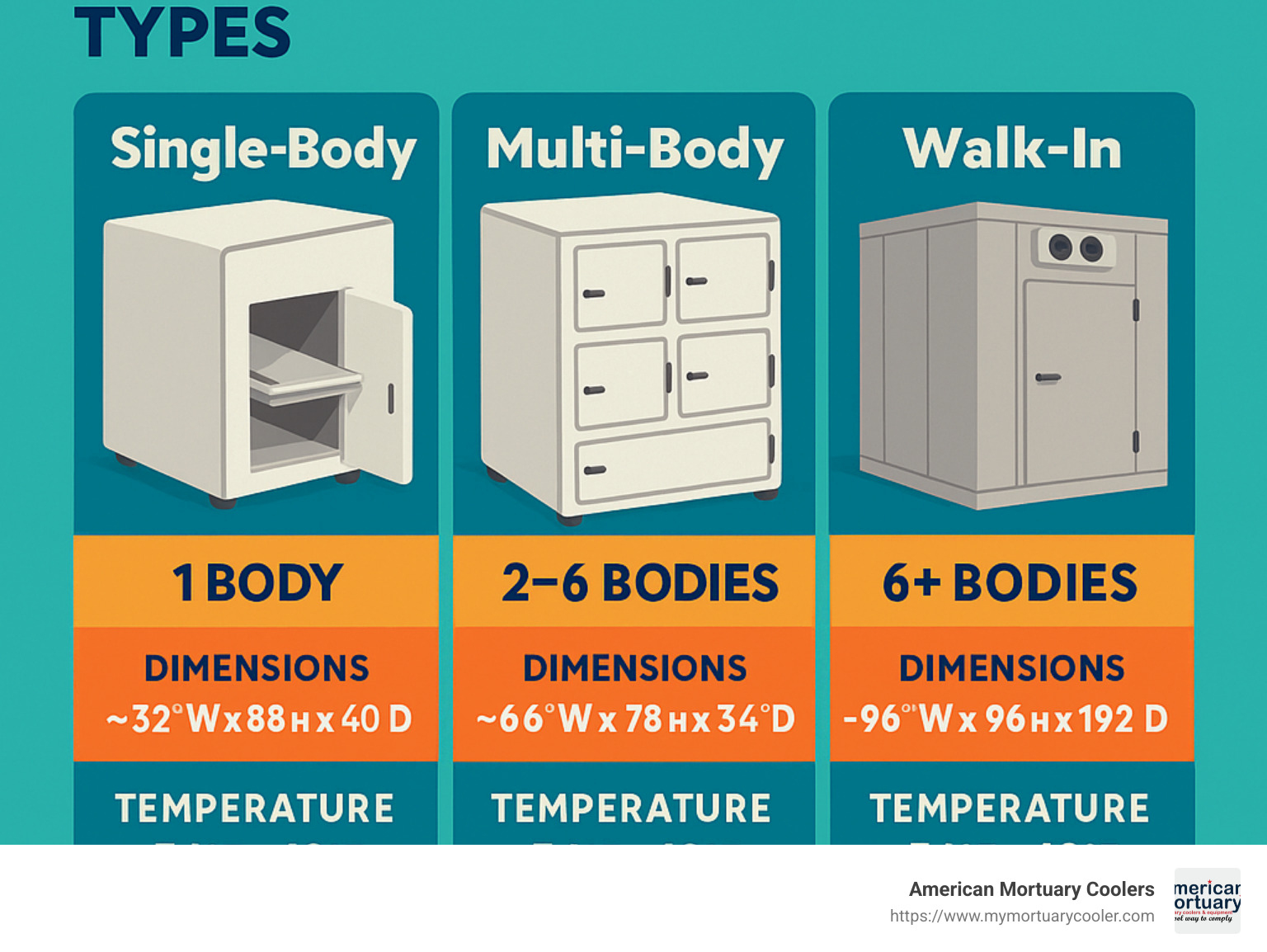
At American Mortuary Coolers, we've helped countless facilities find refrigeration solutions that balance dignity, functionality, and budget considerations. Our experience has taught us that taking the time to assess your specific needs now saves headaches down the road.
For a deeper dive into available options and features, you might find our guide on morgue fridge options helpful as you continue your research.
Wondering about specific terms you've encountered? Here's a quick translation of some common search phrases:
- "Do refrigerated bodies at hospital morgues smell bad" relates to proper temperature maintenance
- "Funeral home fridge" is simply another term for mortuary refrigeration
- "Portable morgue refrigeration" refers to mobile units that can be deployed as needed
This equipment isn't just about preservation—it's about providing dignity and respect during a sensitive time. Taking care to select the right unit for your facility shows your commitment to the families you serve.
What Is a Morgue Fridge and Why Does Every Facility Need One?
Ever wondered what happens behind the scenes at funeral homes and hospitals? A morgue fridge (also called a mortuary refrigerator, body cooler, or cadaver storage unit) is the unsung hero of the death care industry. These aren't your kitchen refrigerators with a few modifications – they're specialized cold storage units designed from the ground up for preserving human remains with dignity and respect.
Morgue fridges for sale do one critical job extremely well: they slow down nature's clock. When a body is cooled to between 2-4°C (35-39°F), the decomposition process dramatically slows as bacterial growth and tissue breakdown are inhibited. This cooling creates a precious window of time for necessary procedures – whether that's an autopsy, family viewings, or preparation for final services.
"The science of body preservation is both fascinating and practical," shares a specialist from American Mortuary Coolers. "Without proper refrigeration, we'd have hours rather than days to complete essential procedures. Modern coolers give families the time they need to gather and say proper goodbyes."
The cold chain in mortuary care isn't just about temperature – it's about maintaining a dignified environment during a sensitive time. Quality morgue refrigeration strikes the perfect balance between scientific preservation and respectful handling of the deceased.
Primary Uses Across Industries
Different facilities have unique needs when shopping for a morgue fridge for sale:
Hospitals need reliable cold storage for deceased patients until families can make arrangements. Hospital morgues might seem small and tucked away, but they're essential infrastructure that must function flawlessly during both routine operations and crisis situations like pandemics or mass casualty events.
Funeral homes consider refrigeration as fundamental as embalming tables. A typical funeral home might need to preserve bodies anywhere from a few hours to several weeks, depending on family wishes, service timing, or special circumstances. The right-sized cooler prevents overcrowding while ensuring every deceased person receives proper care.
Medical examiners and coroners rely on specialized morgue refrigeration that supports forensic work. Their units often feature extra-wide trays for examination, improved security features, and precise temperature logging to maintain evidence integrity. As any medical examiner will tell you, proper preservation is the foundation of accurate forensic findings. For more on how these facilities use morgue fridges in their workflow, see autopsy basics.
Research schools and anatomy labs typically need larger walk-in systems with extensive racking for organizing and accessing multiple specimens. These educational environments require refrigeration that balances preservation needs with accessibility for students and researchers.
The timeline of decomposition waits for no one. Without proper cold storage, natural processes begin immediately after death, creating not just dignity issues but potential health hazards for staff. A quality morgue fridge for sale isn't merely convenient – it's the essential technology that makes modern death care possible.
Types of Morgue Fridges for Sale
When shopping for a morgue fridge for sale, you'll encounter several distinct configurations, each designed for specific facility needs. Understanding these options helps you make a choice that will serve your facility for years to come.
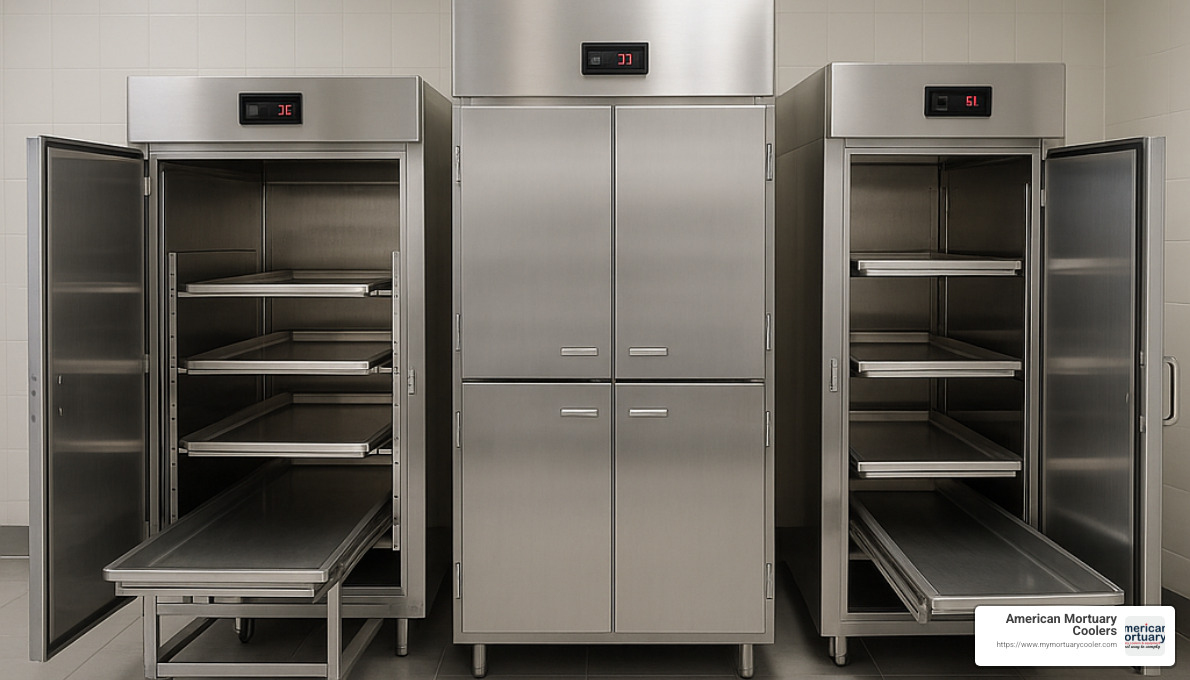
Single & Two-Body Cabinets — The Entry Level Morgue Fridge for Sale
Small facilities like rural funeral homes or community hospitals often start with single or two-body refrigerators. These compact units pack a lot of functionality into a small footprint.
Most single-body units take up minimal space while delivering reliable cooling. The Müller MR-1000, for example, features quality stainless steel construction and precise temperature controls in a compact package.
Two-body models like the AMC Model #2BR offer twice the capacity while still fitting into tight spaces. At just 7'3" × 3'¾" × 5'2", these units can tuck into a corner while providing essential refrigeration. The convenience factor is high too – most plug directly into standard 110V outlets without requiring special electrical work.
"Our 2-body roll-in cooler is our most popular seller," shares a representative from American Mortuary Coolers. "Funeral directors love how it balances their storage needs without taking over their preparation room."
With prices typically ranging from $6,445 to $6,995 for new units, these smaller coolers offer an accessible entry point for facilities with modest caseloads or budget constraints.
Walk-In & High-Capacity Systems
As facilities grow, so do their refrigeration needs. Walk-in systems shine when handling higher caseloads, offering remarkable flexibility and capacity.
These larger units accommodate anywhere from 8 to 50 bodies depending on their configuration. Built with prefabricated modular panels, they offer the advantage of potential expansion or relocation if your needs change. The spacious interiors allow multiple staff members to work simultaneously, streamlining your workflow during busy periods.
Quality walk-in systems feature 4-inch thick insulated panels (typically R-28 for coolers and R-32 for freezers), OSHA-compliant safety release handles, and vapor-proof lighting. While prices start around $13,995 and can exceed $30,000 for larger configurations, the expanded capacity makes them cost-effective for high-volume operations.
Mortech Manufacturing offers impressive walk-in systems with capacities scaling from 5 to 50 bodies using their specialized rack systems. These systems can be customized with various door options – sliding, manual, electric, bi-parting, lift-up, or roll-up – to match your facility's specific workflow needs.
Specialty & Custom Options
Beyond standard models, the market offers specialized morgue fridges for sale designed for unique requirements.
Bariatric storage units feature extra-wide compartments up to 36 inches to accommodate larger individuals with dignity. For forensic institutes and medical examiners requiring long-term preservation, negative-temperature freezers operating at -10°C to -50°C provide the necessary conditions.
Some facilities benefit from pass-through systems with doors on opposite sides, creating efficient workflows between preparation areas. When disaster strikes or temporary capacity is needed, mobile refrigeration units provide flexible solutions for emergency response.
At American Mortuary Coolers, custom solutions are a specialty. "No two facilities are exactly alike," their representative explains. "Our engineers love solving unique challenges – whether it's designing around support columns or creating a system that fits in an oddly-shaped basement."
For more detailed information about the various types available, check out types of morgue freezers and their uses.
Finding the Right Morgue Fridge for Sale: Step-by-Step Buying Guide
Selecting the ideal morgue fridge for sale doesn't have to be overwhelming. With a thoughtful approach, you can find a unit that perfectly matches your facility's needs while respecting your budget constraints.
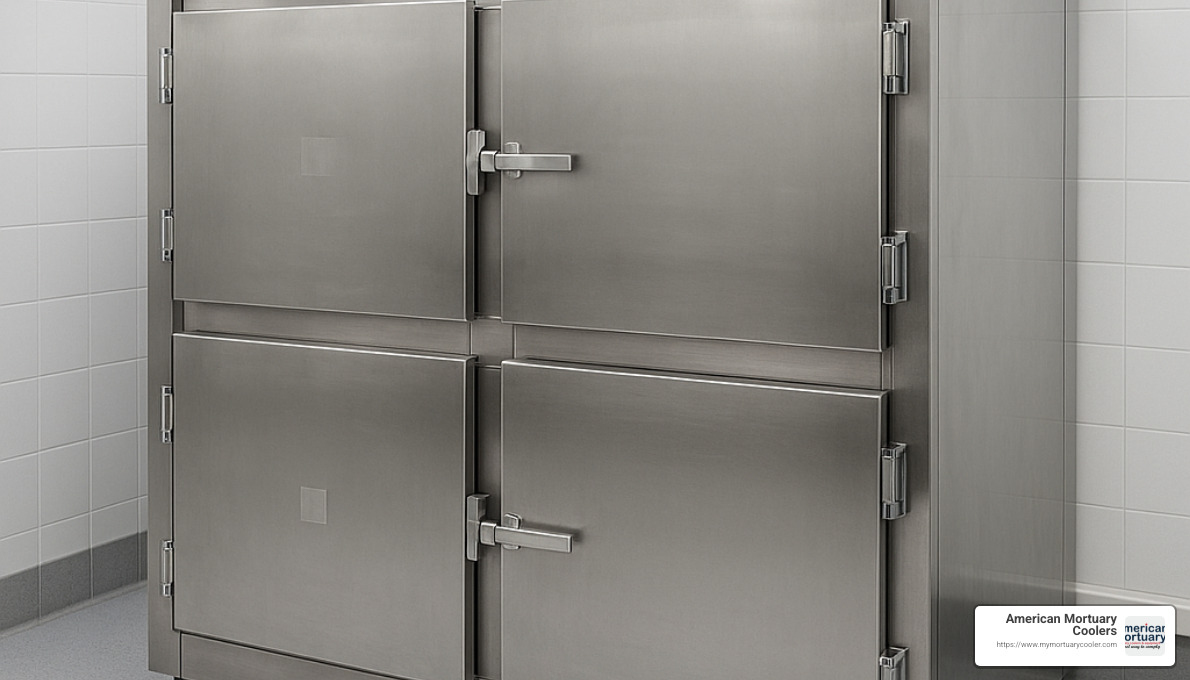
Let's start with the basics. Before browsing options, take a moment to evaluate what your facility genuinely needs. Consider your average and peak caseload – how many bodies do you typically store at once, and what's your maximum during busy seasons? Measure your available space carefully, including doorways and hallways for delivery access. Be honest about your budget constraints, factoring in not just the unit cost but installation and potential financing. And think about your workflow – how will this cooler integrate with your existing preparation and viewing areas?
"I always tell clients to measure twice and order once," says Tom from American Mortuary Coolers. "There's nothing worse than finding the perfect cooler only to find it won't fit through your facility's doorway!"
With your requirements in hand, focus on these must-have features when evaluating options:
Temperature control precision makes all the difference. Look for digital thermostats with ±1°C accuracy and displays you can read without opening the unit. This precision isn't just about performance – it's about peace of mind.
Insulation quality directly affects energy efficiency and temperature stability. Higher R-value panels (between R-21 and R-43) might cost more upfront but will save you money every month on your electric bill.
Construction materials determine how long your investment will last. 26 GA Acrylume or stainless steel interiors resist corrosion and make cleaning easier – something you'll appreciate during years of use.
Door seals and hardware might seem minor, but they're crucial for maintaining temperature integrity. Self-closing doors and magnetic gaskets prevent those "oops, someone left it open" moments that can compromise cooling.
Safety features aren't optional – they're essential. OSHA-compliant safety release handles prevent accidental entrapment, while vapor-proof lighting ensures safe operation in all conditions.
Beyond these basics, pay special attention to the compressor quality. European-made compressors, particularly those from Germany, often run quieter and last longer – a significant consideration for funeral homes where ambient noise can disrupt services.
Budgeting & Typical Price Ranges
Let's talk money. The market for morgue fridges for sale shows considerable variation based on where they're made, how many bodies they hold, and what features they include:
| Type | US-Made (New) | Imported (New) | Used Market |
|---|---|---|---|
| 1-Body | $5,799 | $500-1,500 | $800-1,500 |
| 2-Body | $6,445-6,995 | $1,000-2,500 | $1,500-3,000 |
| 3-Body | $7,500-8,559 | $1,500-3,000 | $2,000-4,000 |
| 4-Body | $9,000-10,500 | $2,000-4,000 | $2,500-5,000 |
| Walk-In (8+) | $13,995-32,995 | $5,000-10,000 | Rare |
Several factors influence these prices. American-made units generally cost more but offer superior durability, support, and parts availability. The construction quality – particularly the grade of stainless steel and insulation thickness – affects both price and longevity. Temperature range matters too; negative-temperature freezers typically cost 20-30% more than standard refrigerators. And additional features like digital controls, alarm systems, and specialty racks can add to the base price.
Don't forget to budget for the extras. Shipping can range from $75 for basic lift-gate service to several thousand for cross-country freight with white-glove installation. Professional setup typically costs $500-1,500 depending on the unit's complexity. Accessories like body trays and racks might be sold separately, adding $500-2,000. And some facilities need electrical upgrades to accommodate larger units.
Fortunately, many manufacturers offer financing options that make these investments more manageable. Look for terms like 0% down and no payments for 90 days with qualifying credit, or equipment leasing programs that help preserve your capital for other needs.
Installation Requirements & Site Prep
Setting up your new morgue fridge for sale properly ensures it will perform reliably from day one. Most standard units (especially American-made models) are designed for straightforward installation.
For electrical requirements, most 1-4 body units conveniently plug into standard 110V outlets, while larger walk-ins might need 220V service. Check your flooring capacity – can it support the unit weight plus bodies (typically 150-200 lbs per tray)? Don't forget about ventilation needs – allow 6-12 inches of clearance around compressor units for proper airflow. Carefully measure all doorways and corridors to ensure delivery access, or choose modular panels that can be assembled on-site.
If you're handling installation yourself, you'll typically need basic tools: a cam-lock wrench (often provided), power drill, socket wrench set, 6' level, rubber mallet, and tape measure. The difficulty ranges from simple plug-and-play units to more complex walk-in systems.
"We design our coolers with real-world conditions in mind," explains Susan from American Mortuary Coolers. "Our standard units are 100% self-contained with no drainage system needed – just plug into a standard outlet and you're running. For customers who prefer not to handle installation themselves, we offer nationwide service through our regional technicians."
After installation, don't skip these essential checks before use: run the empty unit for 24 hours to ensure stable temperature, verify all seals are tight and doors close properly, test any alarm systems and backup features, and register your warranty with the manufacturer.
Maintenance, Safety & Compliance Essentials
A little regular attention extends the life of your investment significantly. Establish simple routine procedures to keep everything running smoothly.
For daily checks, monitor and log temperature readings, inspect door seals for proper closure, and wipe down exterior surfaces to maintain cleanliness. Monthly maintenance should include cleaning condenser coils to prevent overheating, checking drain lines for blockages, inspecting gaskets for wear, and testing alarm systems and backup power.
Once a year, schedule professional service to inspect refrigeration components, calibrate temperature controls, thoroughly clean all parts, and lubricate moving components. This annual check-up often catches small issues before they become expensive problems.
Compliance with regulatory standards isn't just about following rules – it's about safety and professionalism. Key requirements include OSHA compliance with safety release handles on walk-in units to prevent accidental entrapment. Your unit should meet EISA (2007) Title III Section 312 energy efficiency standards for walk-in coolers. Look for ASTM E84 testing certification on cooler panel surfaces for flame and smoke spread ratings. And components that may contact the deceased should have NSF certification.
"Temperature logging has become increasingly important," notes Mike from the technical team. "Many modern units offer 24-hour temperature tracking with password protection and printable records. This feature isn't just convenient – it can be essential during inspections or for forensic applications where maintaining an unbroken cold chain is required documentation."
By following this guide, you'll find a morgue fridge for sale that meets your needs today and serves your facility reliably for years to come. The right unit isn't necessarily the most expensive one – it's the one that best fits your specific requirements while offering the quality and features that matter most to your operation.
For more detailed information about available options, check out More info about morgue fridge options.
Comparing Manufacturers, Warranties & Buying Channels
The marketplace for morgue fridges for sale offers several trusted manufacturers, each bringing something special to the table. Let's explore these options to help you find your perfect match.
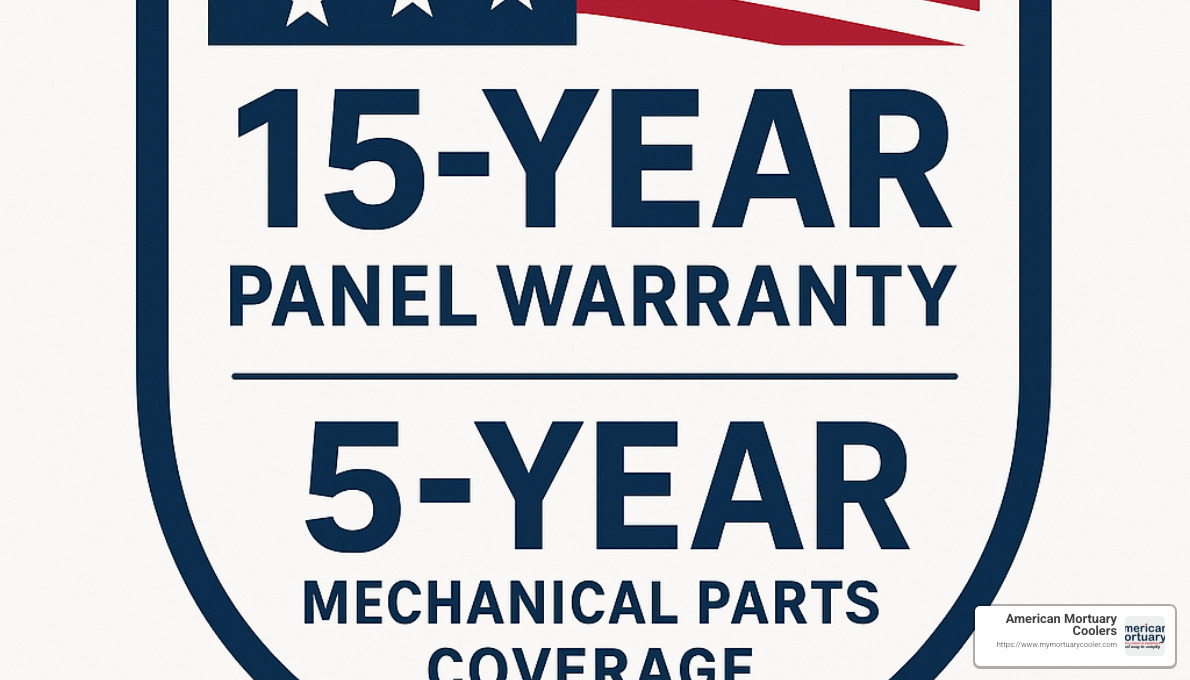
When it comes to American manufacturers, you've got some solid choices. American Mortuary Coolers, based in Tennessee, has built a reputation for custom solutions backed by impressive warranties—15 years on panels and 5 years on mechanical components. Their units feature those sturdy chrome-plated hardware touches and smooth-gliding telescoping slide rails that make daily use a breeze.
Then there's Mortech Manufacturing, the largest morgue refrigeration producer in the country. If you need extensive customization, their cantilever storage racks and specialized bariatric options might be just what you're looking for. Need to move or expand later? Their modular panel design makes that surprisingly simple.
Arctic Industries brings over 40 years of experience to the table with quick-ship walk-in coolers featuring impressive R-values from 21 to 43 depending on the panel thickness. Their 26 GA Acrylume cladding has become something of an industry standard for durability.
Rounding out the American options, AWIC (American Walk-In Coolers) offers EISA-compliant units with high-density insulated panels. I particularly like their UL-NSF approved vapor-proof LED fixtures and the self-actuating door closures that come standard.
Looking overseas, Müller stands out as a premium European option. Their high-resolution temperature calibration and computer-controlled systems appeal to facilities needing precise control. The German-engineered compressors run noticeably quieter than many competitors—a small but meaningful detail, especially in more intimate funeral home settings.
There's also a world of Chinese manufacturers available through platforms like Alibaba. The price difference can be dramatic—often 60-80% less than American-made units—but quality and support vary widely. Many feature stainless steel construction, though standards may differ from what you're used to.
When it comes to warranties, there's a clear divide. American manufacturers typically offer more comprehensive coverage: 15 years on panels and doors, with 5 years on mechanical components. Imported units usually come with just 1-2 years of coverage, and replacement parts can sometimes be challenging to source.
As one of our experts likes to say, "A warranty is only as good as the company standing behind it." Before getting impressd by warranty terms, take a moment to research how long the manufacturer has been around and what customers say about their claim experiences.
You've got several paths to purchase your morgue fridge for sale. Buying direct from manufacturers often nets you the best price and customization options, though it requires more homework on your part. Medical supply distributors offer convenience and sometimes bundle pricing with other funeral supplies you might need.
Online marketplaces like Alibaba open doors to international suppliers with lower prices, though shipping logistics become more complex. Used equipment dealers can offer significant savings, albeit with limited warranty protection. Even auction sites like eBay occasionally feature used morgue refrigerators—we recently tracked one that sold for $3,049 after a heated 68-bid auction!
Pros & Cons of Buying Used Morgue Fridges
If your budget is tight, a used morgue fridge for sale might seem tempting. This approach definitely has its bright spots: cost savings of 40-60% compared to new units, immediate availability without manufacturing wait times, and proven reliability (a well-maintained used unit has already demonstrated it can go the distance).
But there are shadows to consider too. You're often dealing with an unknown history—maintenance records may be nonexistent. Warranty coverage is typically minimal, just 30-90 days if you're lucky. Older units might lack modern digital controls or energy efficiency features. You might face retrofit expenses to adapt the unit to your space. And despite thorough cleaning, some clients express psychological reservations about previously used units.
"Always inspect a used unit while it's running if possible," one of our specialists recommends. "Listen to the compressor sound, check the temperature stability, and examine those gaskets and seals closely—they're usually the first things that need replacing."
Financing & Delivery Options
Fortunately, most suppliers offer financing solutions that make a quality morgue fridge for sale more accessible. Many offer 0% down payment options with no payments for the first 90 days (with qualifying credit). Equipment leasing provides fixed monthly payments with potential tax advantages. Some companies offer rent-to-own programs where each payment builds equity, and there are even healthcare-specific financing options through specialized medical equipment lenders.
When it comes to getting your unit delivered, there are several considerations. Lift-gate service is essential for facilities without loading docks and typically adds $75-150. For a truly hassle-free experience, white-glove installation provides complete professional setup for around $500-1,500, depending on the unit's complexity. Some manufacturers offer discounts for warehouse pickup if you're nearby and able to transport the unit yourself. If you're ordering from overseas, freight costs and customs duties can significantly increase your final price.
"We maintain regional hubs across the US to keep shipping costs and delivery times reasonable," explains American Mortuary Coolers' logistics team. "Our distribution network covers Johnson City, Atlanta, Chicago, Columbia, Dallas, Los Angeles, New York, Pittsburgh, and all major regions, ensuring we can efficiently deliver nationwide."
The right manufacturer and buying approach can make all the difference in your long-term satisfaction. Take your time with this decision—after all, a quality morgue refrigerator is a significant investment that should serve your facility reliably for many years to come.
Frequently Asked Questions About Morgue Fridge for Sale
How many bodies can a standard morgue fridge hold?
When you're researching a morgue fridge for sale, capacity is often the first question that comes to mind. The truth is, there's a size for every facility need.
Most small funeral homes start with a two-body unit, which offers the perfect balance of space efficiency and capacity for typical operations. Single-body units work well for extremely small facilities or as overflow storage, while three and four-body units serve medium-sized funeral homes and smaller hospitals that need more capacity without the footprint of a walk-in.
"We find most of our clients start with a two-body unit and then add capacity as their needs grow," shares a customer service representative from American Mortuary Coolers. "It's the sweet spot for many operations."
For larger facilities handling higher case volumes, six-body upright units provide significant capacity in a relatively compact footprint. And when maximum storage is needed, walk-in coolers with specialized rack systems can accommodate anywhere from 8 to 50 bodies depending on configuration.
With over 500 different models available globally, you'll find options perfectly suited to operations of any size – from the smallest rural funeral home to major metropolitan medical examiner facilities.
What temperature should a morgue fridge run at?
Temperature control is crucial when selecting a morgue fridge for sale, as it directly impacts preservation quality and operational efficiency.
Most standard mortuary refrigerators are positive-temperature units that maintain a consistent 2°C to 4°C (35-39°F). This temperature range strikes the perfect balance – cold enough to significantly slow decomposition processes for typical funeral home timeframes of several days to a few weeks, but not so cold that it creates unnecessary energy costs or complicates preparation work.
For specialized applications requiring long-term preservation, negative-temperature freezers operating between -10°C and -50°C (14°F to -58°F) are available. These units are primarily used in forensic facilities, research institutions, or situations where extended preservation is necessary.
"The stability of the temperature is just as important as the temperature itself," explains a refrigeration technician from American Mortuary Coolers. "High-quality units maintain temperature within ±1°C, preventing the fluctuations that can accelerate decomposition."
For most funeral homes and hospitals, a standard positive-temperature unit provides the ideal combination of preservation capability, energy efficiency, and ease of use.
Can I plug a morgue fridge into a regular wall outlet?
One of the most pleasant surprises for first-time buyers of a morgue fridge for sale is how simple the installation can be. Yes, most standard mortuary coolers – especially American-made models – plug directly into a standard 110V wall outlet, just like your home refrigerator.
These self-contained units come ready to use with no special electrical work or plumbing required. Simply roll the unit into place, plug it in, and you're operational. This plug-and-play design makes installation remarkably straightforward, even for facilities without dedicated maintenance staff.
The typical specifications for standard units include:
- Compressors rated at approximately 1/3 horsepower
- Power draw of around 8.3 amps
- BTU rating of approximately 2610 BTUH for standard two-body units
It's worth noting that most compressors are designed to operate in environments up to 95°F. If your facility regularly exceeds this temperature, you might need to upgrade to a larger compressor or improve your climate control.
"We intentionally design our coolers to be user-friendly," says a representative from American Mortuary Coolers. "The last thing a funeral director needs is complicated installation requirements when they're focused on serving families."
For larger walk-in systems or units with multiple compressors, 220V service may be required. Always check the manufacturer's specifications before purchase to ensure compatibility with your facility's electrical system.
Conclusion
Choosing the perfect morgue fridge for sale is more than just a purchasing decision—it's an investment in your facility's ability to provide dignified care at life's most sensitive moment. After exploring all the options from compact single-body units to expansive walk-in systems, you're now equipped to make a choice that truly fits your unique needs.
Throughout this guide, we've walked through everything you need to know about mortuary refrigeration. The right unit balances your daily caseload requirements with occasional peak demands, all while fitting comfortably within your available space and budget.
When making your final decision, keep these essential points in mind:
Match capacity to your actual needs. There's no one-size-fits-all solution—a small funeral home might thrive with a two-body unit, while a busy hospital might require a walk-in system with capacity for dozens.
Quality components make all the difference. European-manufactured compressors might cost a bit more upfront, but their whisper-quiet operation and remarkable reliability pay dividends for years. Similarly, seamless stainless steel construction creates a sanitary environment that stands up to daily cleaning and disinfection.
Installation is typically straightforward. Most standard units simply plug into a regular wall outlet—no special electrical work required. Just make sure you've got adequate ventilation around the compressor and sufficient space for the unit itself.
Warranty coverage matters. Look for manufacturers offering robust protection—ideally 15 years on panels and doors with 5 years on mechanical components. This coverage reflects a manufacturer's confidence in their product.
Financing can make quality affordable. With options like zero-down payment plans and lease-to-own arrangements, high-quality refrigeration is within reach even for facilities with tight capital budgets.
At American Mortuary Coolers, we deliver custom, U.S.-made units nationwide from our regional distribution centers. Our team specializes in helping you steer the options to find the perfect solution for your specific requirements, with direct delivery across the contiguous 48 states.
Investing in quality mortuary refrigeration shows your commitment to excellence in end-of-life care. The right morgue fridge for sale preserves dignity, improves your operational workflow, and improves your ability to serve families during their most difficult days.
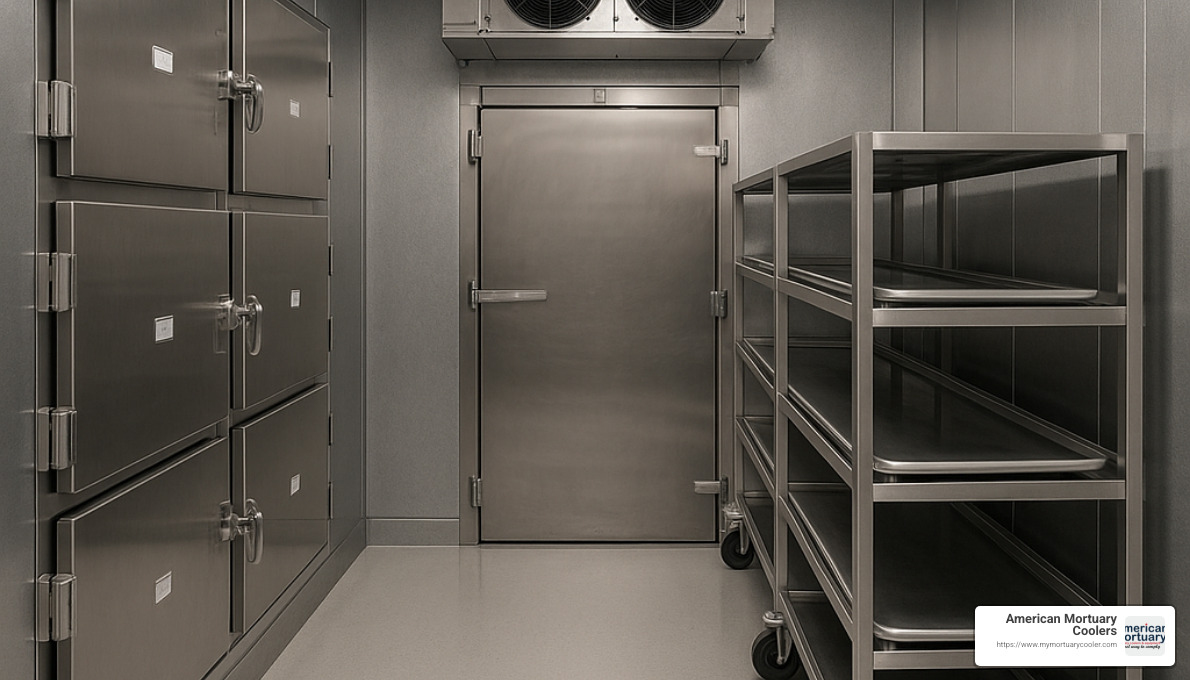
Whether you're setting up a new facility or upgrading existing equipment, we're here to help you steer the options. Our specialists are ready to provide a personalized assessment of your needs and recommend the perfect balance of quality, capacity, and value for your unique situation.


















